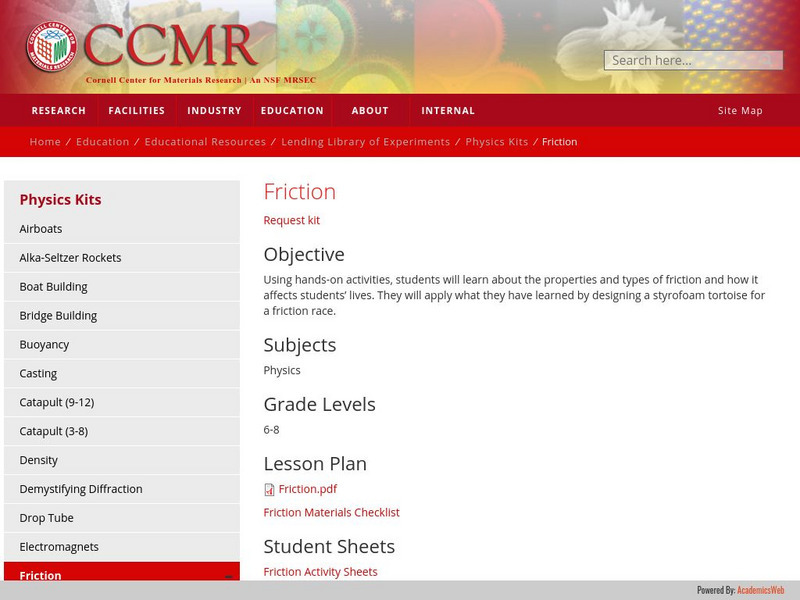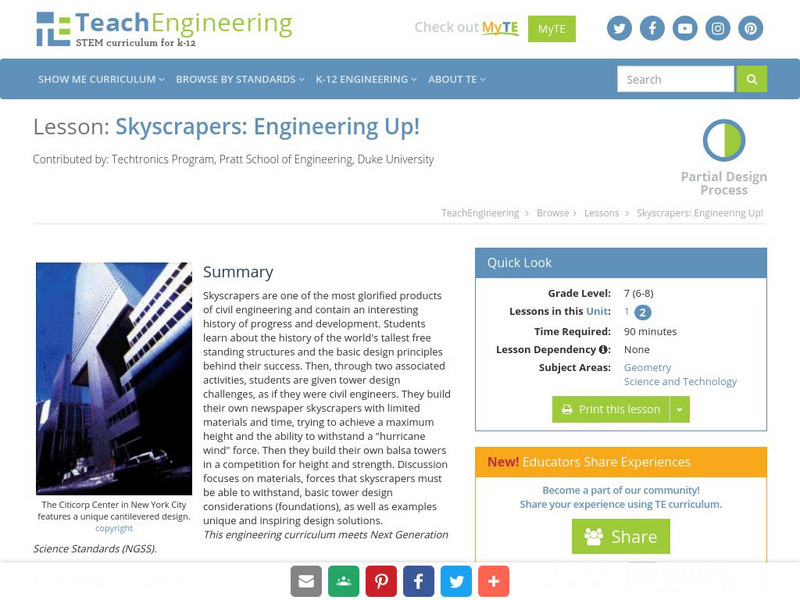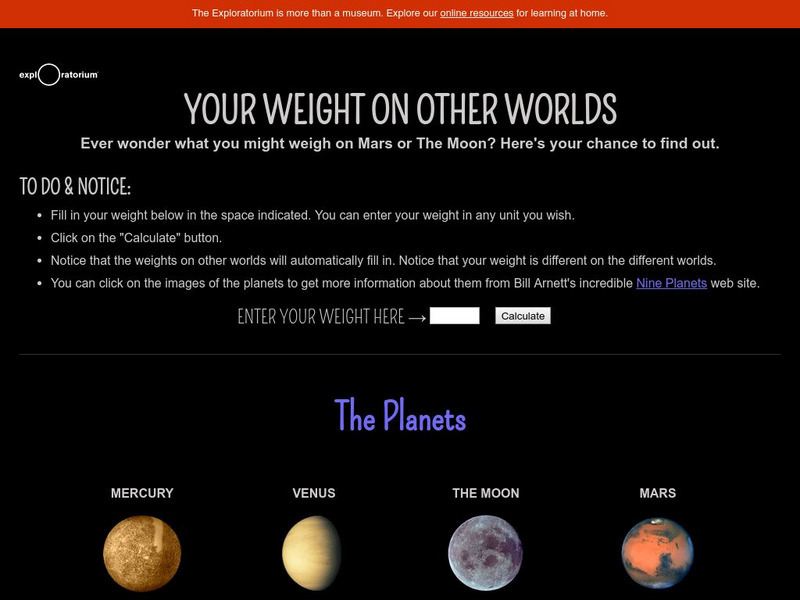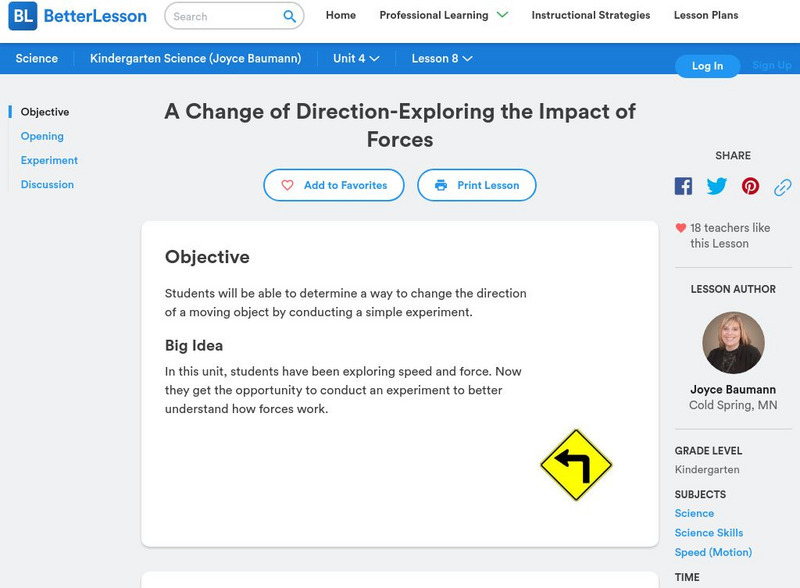Hi, what do you want to do?
Cornell University
Cornell University: Cornell Center for Materials Research: Friction
A collection of experiments where students can learn about how friction works and affects the physical world. At the end, students design a tortoise to win by slowing it down using friction. Lesson includes explanation of the concept of...
TeachEngineering
Teach Engineering: Heave Ho!
Students will discover the scientific basis for the use of inclined planes. They will explore, using a spring scale, a bag of rocks and an inclined plane, how dragging objects up a slope is easier than lifting them straight up into the...
TeachEngineering
Teach Engineering: Wimpy Radar Antenna
Students will reinforce an antenna tower made from foam insulation, so that it will withstand a 480 N-cm bending moment (torque) and a 280 N-cm twisting moment (torque) with minimal deflection. One class will be used to discuss the...
TeachEngineering
Teach Engineering: Skyscrapers: Engineering Up!
Skyscrapers are one of the most glorified products of Civil Engineering and contain an interesting history of progress and development. In this lesson, the students will learn about the history of the world's tallest free standing...
Exploratorium
Exploratorium: Your Weight on Other Worlds
From the Exploratorium Museum. Includes an interactive feature in which a visitor enters their weight on earth and has their weight on other planets computed and displayed. Discusses the distinction between mass and weight and describes...
Physics Classroom
The Physics Classroom: Determining the Net Force
Online classroom site explaining the concept of balanced and unbalanced forces. The site has examples and exercises for the student to review and try.
NASA
Nasa E Clips: Nasa's Launchpad: The Great Boomerang Challenge [Pdf]
Students use the principles of technological and engineering design to research and explain how airfoil shape affects flight characteristics and how it applies to boomerang flight.. They will work in teams to design, build, test, and...
E-learning for Kids
E Learning for Kids: Science: Indian Ocean: What Kind of Natural Forces Do We Recognize?
Learn about forces (push or pull), gravity, and friction in this module by training dolphins.
TryEngineering
Try Engineering: Working With Watermills
Teams of young scholars design, build, test, and evaluate a working watermill made from everyday materials. Lesson explores how watermills generate energy from water, while students gain an understanding of the structural engineering...
BBC
Bbc: Gcse Bitesize: Physics (Combined Science)
This site provides a list of the topics and links to the Physics (Combined Science)courses offered in GCSE Bitesize and a list of contents of each. The topics include the following: Energy, Electricity, Matter, Radioactivity, Forces,...
PBS
Pbs Kids: Activities and Videos: Force/energy
Videos that accompany activities that are hands-on challenges that focus on the engineering design process. They use simple materials, allow for multiple solutions, and are ideal for ages 9-12.
Better Lesson
Better Lesson: A Change of Direction
Students will make predictions and conduct an experiment using marbles to figure out what types of things can cause a moving object to change direction. Included is a video of the lesson in action, pictures, discussion questions, and a...
OpenStax
Open Stax: Extended Topic : The Four Basic Forces an Introduction
In the following interactive students will begin to understand the four basic forces that underlie the processes in nature.
Utah Education Network
Uen: Hammer Time!
Third graders will predict, observe, and compare what happens when a force is applied to an object.
Utah Education Network
Uen: The Heat Is On
Compare relative differences in the amount of heat given off through simple investigations.
Utah Education Network
Uen: Trb 3:3 Investigation 2 Zoom Balls
Third graders will use Zoom Balls to understand how sometimes both forces of push and pull need to be used at the same time.
Utah Education Network
Uen: Trb 3:3 Investigation 4 Collision Zone
Learn how forces of push and pull can change speed or direction.
Utah STEM Foundation
Utah Stem Action Center: Angry Birds Are Mad About Physics
Learn about catapults and Newton's laws of motion.
Science Buddies
Science Buddies: Diy Mini Drone
Explore the world of drones as you build your own mini drone using popsicle sticks in this fun activity.
Science Buddies
Science Buddies: Two Stage Balloon Rocket
Middle schoolers will build a multi-stage balloon rocket that they can launch across the classroom while learning about real space flight and Newton's laws of motion.
Science Buddies
Science Buddies: Teaching the Scientific Method With Paper Rockets
This lesson will introduce your students to the scientific method using a fun, hands-on activity.
Science Buddies
Science Buddies: Learning the Scientific Method With Paper Rockets
Learn about the scientific method in this lesson that uses rockets made from nothing but paper, tape, and straws.
Massachusetts Institute of Technology
Mit: Open Course Ware: Forces: Current Carrying Wires in Magnetic Fields
Learners investigate current-carrying wires in magnetic fields. Some topics explored in the activities are forces, magnetic dipoles, and circuits. The resource consists of video clips, lecture notes, exam questions, java applets, and...
















